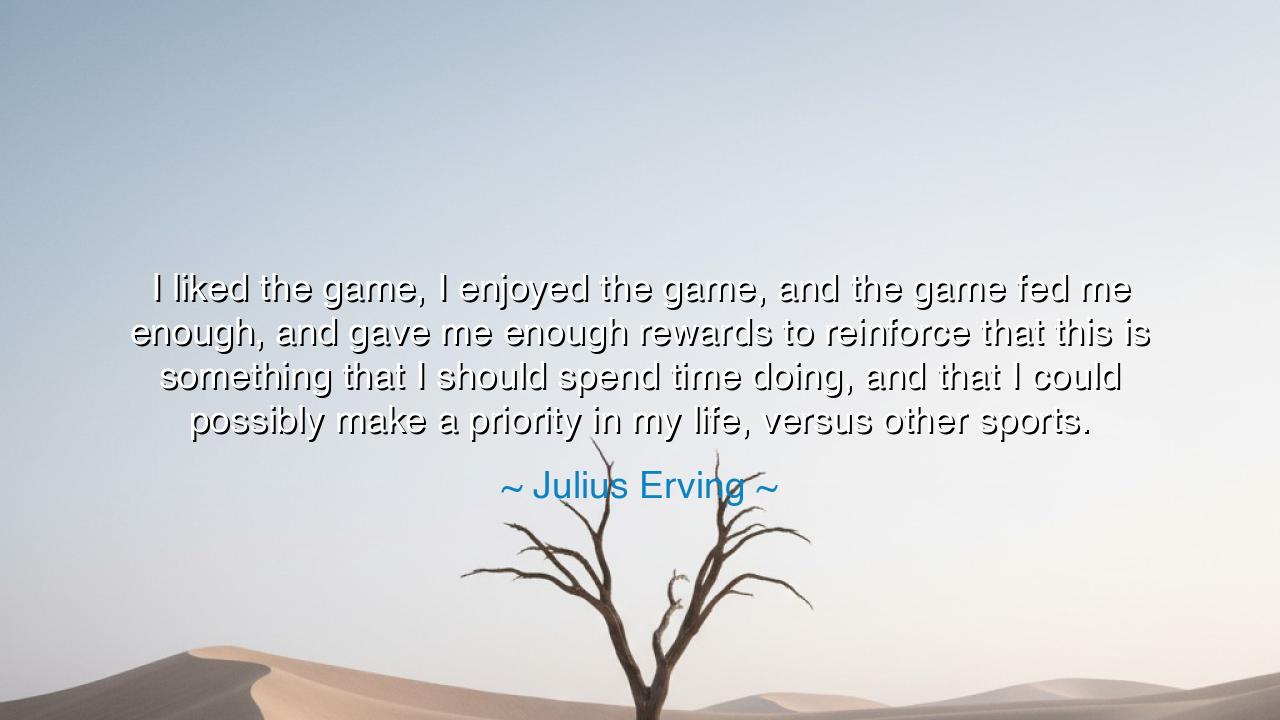
I liked the game, I enjoyed the game, and the game fed me
I liked the game, I enjoyed the game, and the game fed me enough, and gave me enough rewards to reinforce that this is something that I should spend time doing, and that I could possibly make a priority in my life, versus other sports.






In the voice of Julius Erving, the one they called “Doctor J,” there resounds a wisdom as steady as the rhythm of a bouncing ball: “I liked the game, I enjoyed the game, and the game fed me enough, and gave me enough rewards to reinforce that this is something that I should spend time doing, and that I could possibly make a priority in my life, versus other sports.” These words are not the boast of a champion, but the confession of a man who discovered his calling by listening deeply to the gifts of joy and fulfillment. They reveal that greatness is not forced upon us, but flows from the harmony between passion and discipline, between what we love and what gives back to us in return.
When Erving speaks of how he “liked the game” and “enjoyed the game,” he names the beginning of all mastery: affection. For no one becomes truly great at a task they despise. Love is the seed of excellence. Yet affection alone is not enough, for many things may entertain us for a season. What makes the difference is that the game, as he says, “fed” him—it nourished his spirit, rewarded his effort, returned energy for energy, until the bond between man and craft became unbreakable. This is the cycle of true vocation: love gives rise to practice, practice yields reward, and reward deepens love.
This same truth can be found in the story of Confucius, who said, “Choose a job you love, and you will never have to work a day in your life.” Like Erving, Confucius understood that the most fruitful labor is born not of mere necessity, but of delight. A farmer who loves the soil rises gladly before dawn. A poet who delights in words bends his ear to every whisper of language. And a player who loves the court will find his body drawn again and again to the game, not as a burden, but as a joy. Such devotion is the soil from which mastery grows.
Yet Erving’s words are also about choice. He knew many sports, but he listened to the one that spoke most clearly to his heart. The game gave him reasons—rewards, reinforcement—that others did not. In this, his story is like that of the philosopher Socrates, who urged each man to “know thyself.” Not every field is for every hand, nor every sport for every soul. Wisdom lies in discerning which pursuit returns the greatest fruit for your labor, and then making it a priority above the rest. To spread oneself too thin is to remain shallow; but to commit oneself fully is to carve a path toward greatness.
And so we see in Erving’s words the union of passion and pragmatism. He did not simply chase joy blindly, nor did he endure toil without love. He chose the game that gave back to him, the one where his effort was multiplied into skill, recognition, and fulfillment. This is the balance that all must seek: to find the work that both delights and sustains, that is both pleasurable and purposeful. For in that union lies not only success, but a life well-lived.
The lesson is clear for all who hear: do not chase every path, nor force yourself upon pursuits that give you nothing in return. Listen carefully to your own gifts, and ask: What nourishes me? What returns joy for effort? What makes me stronger, wiser, more alive? When you find that path, give yourself to it with the seriousness of a vow, and let it take priority in your life. For there, in that place where delight meets discipline, lies the seed of greatness.
So let the teaching be handed down: choose the work that feeds you as you feed it. Like Julius Erving upon the court, let your hands and heart join in a labor that returns its rewards. In this way, you will not only achieve excellence, but you will live in harmony with your calling. And when you look back, as he did, you will see not just success, but the joy of a life given to the right game.






AAdministratorAdministrator
Welcome, honored guests. Please leave a comment, we will respond soon